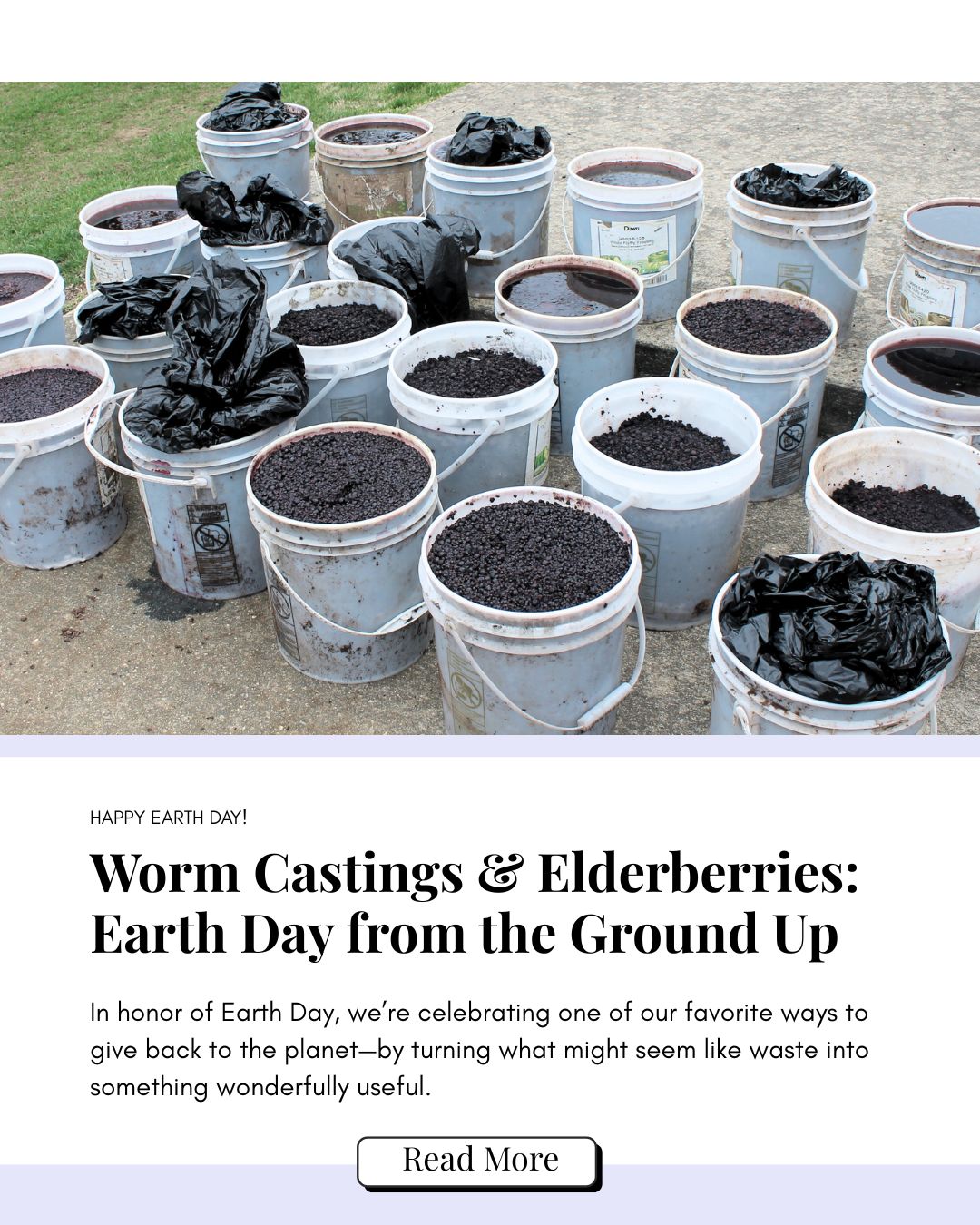By Marley Archibald
In honor of Earth Day, we’re celebrating one of our favorite ways to give back to the planet—by turning what might seem like waste into something wonderfully useful. Behind the scenes in the making of our Elderberry Syrup, once it’s brewed, we’re left with rich, fruity remnants that still have so much to offer.
Instead of tossing them out, we’ve found a simple, sustainable solution that many may not be familiar with: worm composting! It’s a beautiful cycle— what once nourished your body can now help nourish the soil. We have a close relationship with a local worm farmer of 35 years, Paul Schellenberger, who uses the leftovers from our syrup in order to produce valuable wormcastings (yes, that’s a fancy way of saying worm poop—and it’s amazing for plants!).
Worm composting, also called vermicomposting, is a natural process where specific types of worms—like red wigglers—break down organic material into nutrient-rich compost. It’s a fantastic way to reduce food waste, recycle nutrients back into the earth, and build healthier soil in the process. To help us (and you) better understand the ins and outs of this eco-friendly method, we chatted with Paul about his experience and how our elderberry mash fits into the story. Read on to learn how our elderberry leftovers are making worms (and gardens) extra happy this Earth Day and beyond.
How did you discover worm composting, and what compelled you to get started?
“Operating as an organic gardener for 50 years, I learned that the earthworm plays a significant role in the soil. I wanted to develop the most enriched soil for my garden and perennial natural landscape. Starting 35 years ago with just 1 pound of red wiggler earthworms (about 1,000 worms), the population has now increased to 40 pounds (about 40,000 worms).
The growing population needed more food– my challenge now was to find food that was organic material from post-consumer sources such as coffee grounds, cardboard, garden waste, agricultural waste, and my own kitchen waste. Then, I found your 'elderberry mash.'"
How do you use your wormcastings?
“Wormcastings (i.e., earthworm poop), can be applied by adding a handful into the planting hole of a vegetable or flower, mixing it with the soil that returns to the planting hole. I repeat this mantra to interested individuals: wormcastings are Nature's processed plant food.
Through the action of earthworms– consuming, digesting, excreting– earthworms have turned organic material such as coffee grounds, leaves, grass clippings, cardboard, fruits, vegetables and others, into natural nutrients vital for plant life.”
Why would somebody choose worm composting over hot composting (a process which relies on heat and frequent turning to break down materials)?
“Wormcompost is an odorless material that holds moisture, and it is filled with soil microbes that work with the plant's roots. Hot compost is also valuable, but has not been consumed and digested through the earthworm's gut, which is full of beneficial microbes.”
What are some of the biggest challenges you have encountered?
“While not a major challenge, it must be understood that earthworms are animals. They require proper moisture and temperature limits, and acceptable foods, while many, some are not recommended.
That is part of why this partnership with The Elderberry Co., this wormcomposting project for the past 5 years, has been a WIN for myself, for your business, and for Nature. We have diverted organic material from being dumped into the landfills, keeping them in the 'organic cycle' of Nature to be used over and over.”
Paul’s story is a perfect example of how small-scale sustainability can have a big impact. Instead of contributing to landfill waste, our elderberry leftovers are feeding an entire ecosystem of worms that are, in turn, creating rich, plant-loving soil.
This “closed-loop” process is a dream for gardeners and nature-lovers alike, and it all starts with understanding how powerful worm castings really are.
This Earth Day, we’re reminded that sustainability doesn’t have to be complicated. Sometimes, it starts with a simple question: What else can this be used for? For us, the answer is clear— our elderberry remnants still have a job to do. Whether you’re a home gardener, a nature enthusiast, or just curious about ways to reduce waste, worm composting is a powerful practice that makes a difference. And we’re grateful to be part of that cycle—one spoonful of syrup (and scoop of compost) at a time.


4 comments
Hey there, Rhonda! Farmer Paul does occasionally sell his castings at local farmers markets.
I love this story. Many of us use worm castings & compost tea to enrich our plants & produce. Does Farmer Paul market his products? Or does he sell to a local retailer? I would love to hear the rest of that story. And remember … “Everyday is Earth Day!”
Thank you so much for sharing this information. I’m glad to hear of the organic recycling that is going on. I knew worms were good for the soil, but never thought to look more into it. Appreciate the interesting information and my family and friends are loving the Elderberry Syrup and magnesium balm.
I’ve been a customer of your wonderful products for over 5 years now, and we love all we buy! Guess what we were out doing this morning here near Mt. Hood, Oregon??? We were preparing our garden areas by amending them with WORM CASTINGS! :) What a great article about a practice that is SO great! Thank you for sharing!